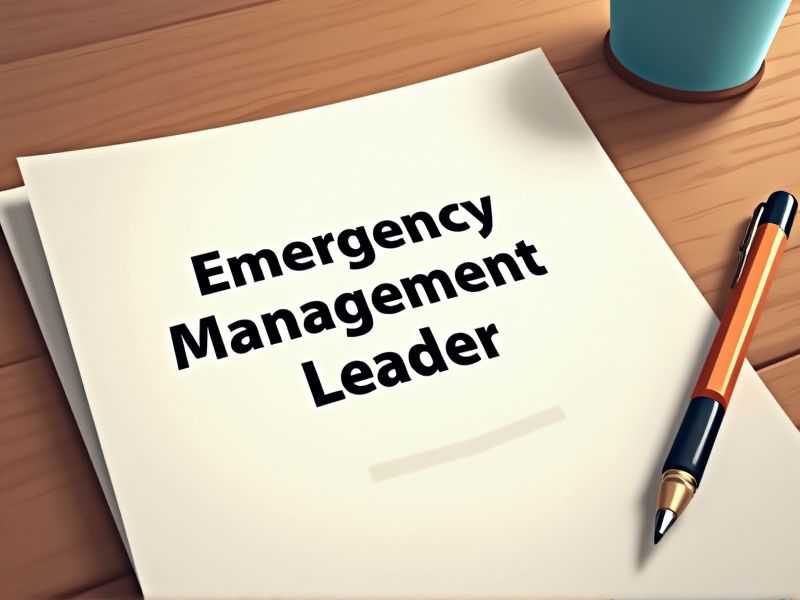
Emergency Management Leaders often tackle complex situations where thorough knowledge is crucial. Certifications ensure they possess standardized skills and grasp essential protocols to respond effectively in emergencies. These credentials also promote credibility and trust, which are vital in high-stress scenarios. Key certifications can bolster your preparedness and expertise as an Emergency Management Leader.
Certified Emergency Manager (CEM)
The presence of a Certified Emergency Manager (CEM) enhances credibility, demonstrating a mastery of emergency management principles and practices. Achieving CEM status indicates a commitment to ongoing professional development, ensuring leadership remains current with best practices and new strategies. CEM credentials can improve coordination between agencies by establishing a standardized foundation of knowledge and skills. Disasters often involve complex problems; a CEM provides the leadership required to effectively navigate and mitigate these challenges.
Associate Emergency Manager (AEM)
An Associate Emergency Manager (AEM) ensures that emergency management leaders have knowledgeable support in implementing effective preparedness and response strategies. When unforeseen incidents occur, the AEM provides critical assistance in coordinating resources, which helps leaders mitigate risks efficiently. Maintaining up-to-date certifications, AEMs bring the latest industry standards and practices into planning processes, bolstering the leader's capacity to make informed decisions. By managing day-to-day emergency operations, AEMs allow leaders to focus on strategic oversight and long-term resilience planning.
FEMA ICS-100 Certification
FEMA ICS-100 Certification provides foundational knowledge of the Incident Command System, enabling emergency management leaders to effectively coordinate response efforts. Standardized communication protocols taught in ICS-100 improve cross-agency collaboration, essential for large-scale emergency operations. Understanding ICS principles helps leaders quickly integrate into multi-agency teams, reducing response times during crises. Certification signals a commitment to preparedness and enhances credibility with stakeholders and the community.
FEMA ICS-200 Certification
FEMA ICS-200 Certification is necessary for an Emergency Management Leader because it ensures a standardized approach to incident management, critical for coordinated response efforts. The certification provides leaders with skills to work efficiently within the Incident Command System, crucial for effective resource allocation during emergencies. Adherence to ICS principles enhances communication, reducing the risk of operational missteps that could exacerbate situations. With this certification, leaders gain credibility, building trust among team members and stakeholders in crisis situations.
FEMA NIMS Certification
FEMA NIMS Certification standardizes emergency management procedures, ensuring a coordinated response during crises. This certification instills confidence in leadership by verifying expertise in national guidelines and protocols. It enhances interagency communication, essential for effective collaboration among multiple response teams. Compliance with NIMS fosters efficient resource allocation, crucial for quick and effective disaster response.
Certified Business Continuity Professional (CBCP)
The Certified Business Continuity Professional (CBCP) credential provides an emergency management leader with a recognized standard of expertise in managing disruptions. This certification enhances their ability to develop comprehensive strategies for maintaining critical operations during crises. It ensures the leader is equipped with the knowledge to assess risks and implement recovery solutions effectively. Executives and stakeholders often trust leaders with CBCP credentials more, increasing confidence in the organization's resilience planning.
Certified Crisis Management Professional (CCMP)
The increasing frequency and severity of natural disasters create complex challenges requiring specialized crisis management skills, making a Certified Crisis Management Professional (CCMP) essential. During a crisis, effective response and recovery hinge on the strategic planning and decision-making skills that a CCMP provides. With stakeholders demanding transparency and accountability, a CCMP ensures adherence to industry standards and best practices. The evolving threat landscape, including cyber threats and pandemics, requires a CCMP's expertise to adapt and mitigate risks effectively.
Advanced Incident Command System (ICS) Certification
Having Advanced Incident Command System (ICS) Certification equips an emergency management leader with the structured framework necessary to coordinate complex incidents effectively. This certification ensures the leader can efficiently delegate tasks and manage resources, minimizing chaos during emergencies. Proficiency in ICS fosters improved communication across various agencies, resulting in a more unified response effort. The certification validates the leader's ability to anticipate challenges and adapt strategies to evolving situations, raising the overall resilience of the disaster response process.
ISO 22301 Lead Implementer Certification
ISO 22301 Lead Implementer Certification equips emergency management leaders with a robust framework for business continuity, enhancing their ability to manage disruptions effectively. When leaders implement these standards, they improve organizational resilience by systematically identifying potential threats and mitigating impacts. The certification fosters a deeper understanding of international best practices, ensuring leaders are prepared for various emergency scenarios. Organizations gain credibility and trust from stakeholders, as certified leaders demonstrate a commitment to maintaining operations during crises.
Community Emergency Response Team (CERT) Certification
Having a Community Emergency Response Team (CERT) Certification enhances an emergency management leader's ability to effectively coordinate local response efforts. It provides them with essential knowledge and skills in disaster preparedness and basic emergency response techniques. Increased competence from the certification leads to better decision-making during critical situations. Enhanced collaboration and communication with community members and first responders improve overall emergency response outcomes.
Summary
When you pursue certifications in emergency management, you enhance your knowledge and skills, leading to improved decision-making and strategic planning. This expertise can result in more efficient response to crises and better coordination among teams. Certified leaders often gain credibility, earning trust from stakeholders and communities. This recognition can facilitate resource allocation and collaboration with other organizations during emergencies.
